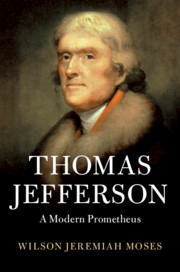Book contents
- Thomas Jefferson
- Cambridge Studies on the American South
- Frontispiece
- Thomas Jefferson
- Copyright page
- Dedication
- Contents
- Preface
- Acknowledgments
- Note on Methods and Bibliography
- 1 Introduction
- 2 Lincoln and Historiography
- 3 Let Our Workshops Remain at Monticello
- 4 Life, Liberty, Property, and Peace
- 5 What is Genius? “Openness, Brilliance, and Leadership”
- 6 A Renaissance Man in the Age of the Enlightenment
- 7 Baconism and Natural Science
- 8 Anthropology and Ethnic Cleansing: White “Rubbish,” Blacks, and Indians
- 9 Education, Religion, and Social Control
- 10 Women and the Count of Monticello
- 11 Debt, Deference, and Consumption
- 12 Defining the Presidency
- Index
7 - Baconism and Natural Science
Published online by Cambridge University Press: 01 April 2019
- Thomas Jefferson
- Cambridge Studies on the American South
- Frontispiece
- Thomas Jefferson
- Copyright page
- Dedication
- Contents
- Preface
- Acknowledgments
- Note on Methods and Bibliography
- 1 Introduction
- 2 Lincoln and Historiography
- 3 Let Our Workshops Remain at Monticello
- 4 Life, Liberty, Property, and Peace
- 5 What is Genius? “Openness, Brilliance, and Leadership”
- 6 A Renaissance Man in the Age of the Enlightenment
- 7 Baconism and Natural Science
- 8 Anthropology and Ethnic Cleansing: White “Rubbish,” Blacks, and Indians
- 9 Education, Religion, and Social Control
- 10 Women and the Count of Monticello
- 11 Debt, Deference, and Consumption
- 12 Defining the Presidency
- Index
Summary
It was 1790, and Jefferson was still enraptured with Francis Bacon and his Novum Organum Scientiarum published in 1620. If that work, which had deeply influenced the generation of Voltaire, had one dominant theme, it was the need to rid the mind of prejudices and prior conceptions. Jefferson, although still capable of growth, was nonetheless inclined to smirk at ideas that contradicted truths he held to be “self-evident.”1 At the time of his 1785 arrival in Paris his worldview was still grounded in the medieval cosmology of the Great Chain of Being, and his understanding of science was still rooted in deductions from “the laws of nature.” He could show respect for experimentalism, as late as his 80s, when he had a burst of excitement for vivisection as practiced by Jean-Pierre Flourens in the field of brain physiology.
- Type
- Chapter
- Information
- Thomas JeffersonA Modern Prometheus, pp. 236 - 269Publisher: Cambridge University PressPrint publication year: 2019

